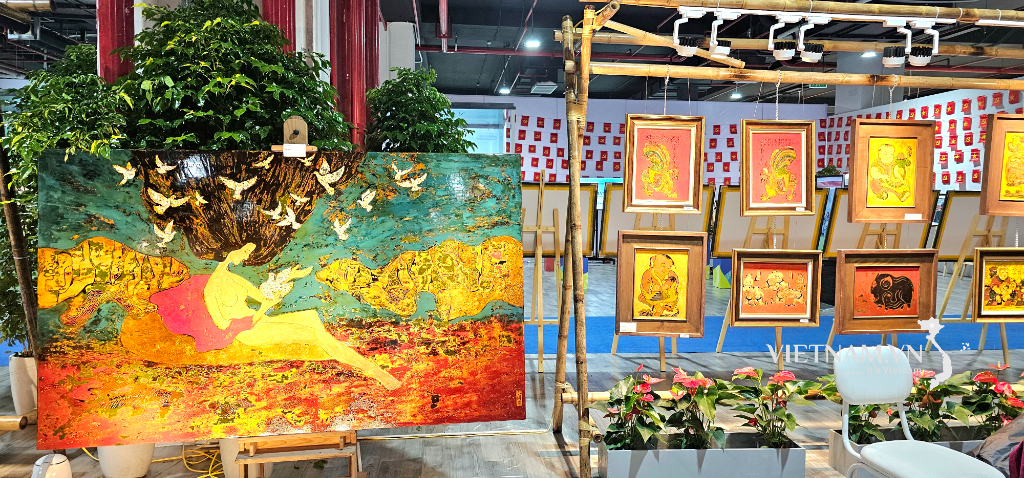The golden seal "Emperor's Treasure" – which Emperor Bảo Đại presented to the revolutionary government at Ngọ Môn Gate on August 30, 1945 – is one of the most special national treasures. That historic abdication ceremony is not unfamiliar to my family's memory. The bodyguard who received the seal and sword – Mr. Hoàng Xuân Bình – was a relative on my maternal side, belonging to the Hoàng Xuân scholarly family in Yên Hồ, Hà Tĩnh. When Emperor Bảo Đại went to Hanoi to meet President Hồ Chí Minh, he trusted the young intellectual Hoàng Xuân Bình to be his bodyguard and liaison officer.
Mr. Pham Khac Hoe, the Chief of the Imperial Office during Emperor Bao Dai's reign, who participated in organizing the ceremony of handing over the royal seal and sword and later oversaw the inventory of royal assets transferred to the new government, was the grandson of Governor Hoang Xuan Phong. While my paternal grandparents were still alive, I had the opportunity to meet him a few times when he visited our home. The poet Cu Huy Can – a close friend of my grandfather, and the writer Bui Hien – were among the three government representatives who received the seal and sword. From a young age, I memorized the powerful declaration in the abdication edict of the last emperor of the Nguyen dynasty: "I would rather be a citizen of a free country than a king of a slave country."
Those historical connections made the trip to see the golden seal not just a sightseeing trip, but a journey of memories. I wanted to inspire my children in that way. But the sacred moment was quickly shattered.
That day, a group of nearly 50 tourists swarmed into the exhibition hall. They laughed and chatted, some filming , others taking photos. Someone exclaimed, "Wow, so much gold!", another commented, "It must be full of security cameras." No one paid attention to the story related to the gold seal. The narrator's voice faded and then fell silent. The entire room became a noisy stage, where the treasure was merely a prop for photos to be posted online.
I considered speaking up, hoping to maintain some decorum in the exhibition space, but then hesitated. Having been met with disapproving looks many times before for reminding people in public, I felt reluctant. I only spoke privately with the guide about a few inaccuracies. "I'm just repeating what I read in the textbook," the guide, probably an office worker doing the job part-time, said, scratching his head.
I left the museum with mixed feelings of joy and sadness. Joy because, after many years of being lost, the largest imperial seal of the Nguyen Dynasty had returned home. It is a precious artifact of a dynasty that once expanded its borders, established sovereignty over the Hoang Sa and Truong Sa islands, and shaped the S-shaped country we see today. But sadly, as I witnessed, the way it was received by a segment of the public was superficial, indifferent, and even somewhat disrespectful.
Beyond being just a visitor, I've also experienced the dilemma of choosing how to preserve my family's legacy. My grandfather, with his meticulous record-keeping habits, left behind over 70 volumes of diaries along with dozens of letters exchanged with Nguyen Tuan, Nguyen Hong, Nguyen Cong Hoan, and others. My family hesitated when the National Archives contacted us to request their acceptance. Would these fragile documents be properly cherished and preserved?
That anxiety only truly dissipated after a recent meeting organized by the Center. We witnessed firsthand the modern archiving system, capable of preserving documents for the long term. But what reassured us even more was the professionalism and dedication of the archiving staff. In particular, the recognition of composer Hoang Van's collection as a World Documentary Heritage by UNESCO has strongly inspired many families of artists and writers. Clearly, the memories of a nation will be recognized internationally if they are properly preserved.
From stories of national treasures to family diaries hidden in drawers, I've realized one thing: no heritage can endure without three accompanying elements – owners who understand its value, responsible keepers, and communities that appreciate it. When a heritage site becomes merely a backdrop for selfies, when a royal throne is vandalized, it's not just the museum's fault; it's the result of a shallow education system.
To address the neglect of heritage and artifacts, disciplinary measures against caretakers, such as the dismissal of a security guard at the Hue Imperial Citadel Conservation Center, are perhaps only superficial solutions. Heritage cannot simply remain in glass cases, "protected" by a few cameras and red velvet ribbons. Heritage needs to live on in awareness, in education, in family stories, and above all, in the hearts of people.
When history is confined to rigid textbooks, when explanations are merely formulaic texts, even the most precious artifacts will eventually turn to stone, becoming alien to the people themselves. A society lacking the ability to connect with the values passed down from previous generations will find it difficult to build the consensus, resilience, and cultural depth necessary for development. Without the support of a cultural foundation, socio-economic goals easily become distant, isolated, and lifeless.
And to achieve that, every heritage item—whether a two-hundred-year-old gold seal, a handwritten musical score, or a page from a family diary—needs to be recognized for its true value, recounted with the complete objectivity of a community that knows who it is, where it comes from, and where it wants to go.
According to vnexpress.net
Source: https://baoapbac.vn/van-hoa-nghe-thuat/202506/an-vua-va-anh-selfie-1044374/
































































































Comment (0)